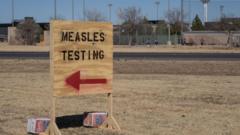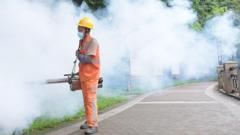The ongoing measles outbreak in western Texas has claimed a second child's life, emphasizing the critical need for vaccination as the number of cases rises. Health officials and experts are calling for immediate action to address the outbreak, while the response of Health Secretary Robert F. Kennedy Jr. is under scrutiny.
Measles Outbreak Claims Second Life in Texas, Sparking Vaccination Debate

Measles Outbreak Claims Second Life in Texas, Sparking Vaccination Debate
A second child dies from measles in western Texas as the outbreak grows, raising urgent discussions around vaccination and public health strategies.
A second child has succumbed to the measles virus in western Texas, highlighting the severity of an outbreak that has brought about over 480 reported cases this year. The school-aged girl, who was unvaccinated and without underlying health issues, suffered from complications related to the virus, according to Aaron Davis, vice president of UMC Health System. This tragedy comes amid increased scrutiny of Health Secretary Robert F. Kennedy Jr.'s management of the health crisis, with reports indicating he plans to travel to Texas in light of recent developments.
As of this week, the number of measles cases in Texas has surged to over 480, climbing from 420 earlier in the week, and public health experts suggest this outbreak has reached neighboring states as well. The child’s death is likely the third linked to the growing outbreak, as the resurgent virus continues to predominantly affect unvaccinated individuals. Public health statistics show that the U.S. has recorded over 600 cases of measles this year, many stemming from this specific outbreak in Texas.
The eight-year-old girl reportedly died from "measles pulmonary failure," with her passing drawing renewed attention to the importance of vaccinations, which health officials assert are crucial in preventing complications associated with the highly contagious disease. The outbreak is believed to have originated in a religious community that has historically rejected vaccinations, leading to persistent challenges in raising local immunization rates.
In a landscape increasingly marked by vaccine hesitancy, the situation has prompted widespread calls for stronger public health messaging. Mr. Davis highlighted the critical need for vaccinations, stressing that herd immunity—where approximately 95% of the population is immunized—is essential to protect those unable to receive vaccines.
While Kennedy acknowledged the gravity of the situation after the first child's death, his advocacy stopped short of directly urging parents to vaccinate, a stance that has drawn criticism from health experts who advocate for a more forthright push for immunization. In what has become a contentious aspect of the response, Kennedy has also suggested Vitamin A as a treatment for measles—an approach met with skepticism by medical professionals.
As the outbreak continues to expand, local health agencies voice concerns regarding their progress in improving vaccination coverage amid rising anti-vaccine sentiment. The pressing situation in Texas serves as a stark reminder of the ongoing challenges posed by vaccine hesitancy and the vital importance of public health initiatives in preventing outbreaks of vaccine-preventable diseases.




















